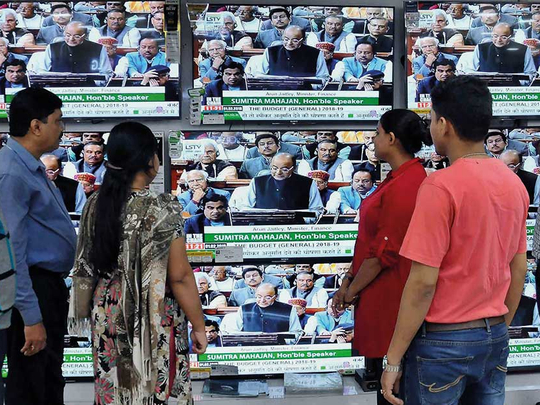
Dubai: This is the story every year. There always have been demands from the Indian community abroad, which remitted more than $65 billion last year making the country the top most recipient of dollars globally, but hardly anything came their way in this budget, like in the past.
Non-resident Indians (NRI) had expected a custom duty exemption for gold ornaments for up to 50 grams for males and 100 grams for females. The community also wanted a rationalisation of 10 per cent import duty on gold.
The NRIs also expected some pension plan, and a reduction of GST on property transaction from 12 per cent to 5 per cent.
“From an NRI perspective, the budget does not have anything to write home about. We expected certain tax reforms relating to investments in India, but the business community will be disappointed with the oversight,” Adeeb Ahamed, Managing Director, Lulu Exchange Holdings and Twenty 14 Holdings told Gulf News.
Dr Ram Buxani, Chairman of IPL Group agreed.
“Taking into consideration that Prime Minister Narendra Modi is visiting UAE in a few days, it was expected that NRI community, whose number exceeds three million in the UAE alone, would have some favourable words in the budget. Regrettably they remained neglected,” Buxani said.
In 2014, the government came up with a tax for NRIs.
12.3% service tax introduced in 2014 on fees paid by agents for facilitating remittances.
The government levied a 12.36 per cent service tax on fees or commission paid by agents for facilitating remittances, thereby making it a little more expensive for expats to send money back home.
Most of the money that is sent home by the NRIs either gets invested in property, stocks, bonds or gold.
“The major decision that was expected is in the investments by NRI in the real estate, where reduction of GST on property transactions and legal reforms allowing NRI’s to invest in agricultural properties would have been welcome considering that NRI’s have great potential to turn around the Indian property, land and real estate scenario,” Sripriyaa Kumaria, director-general ITEC Middle East and Secretary General, Business Leaders Forum (BLF) said.
Populist stance:
The budget instead kept its focus on rural areas with next general and state elections in mind.
“Keeping in mind the fact that, currently India is seventh largest economy and looking to reach fifth position, this is a very encouraging and growth-oriented budget with more emphasis given on rural and infrastructure development,” said Yusuff Ali MA, Chairman of Lulu Group.
100,000,000 Indians will receive health insurance coverage worth Rs500,000 (Dh28,672), among other steps like extending billions to micro enterprises.
To woo the rural voters, finance minister Arun Jaitely said the government will work to improve the price realisation of farm products, by increasing the minimum support price for farm produce. About 100 million Indians will receive a health insurance of Rs500,000 (Dh28,672), among other steps like extending billions of dollars to micro enterprises.
Rs40,000 tax relief announced by government for expenses on health.
“This is an excellent pro-farmers pro-rural budget. The budget has given a tax relief up to 40,000 Indian rupees as expenses on health. The budget will act as further boost to the good environment required for the FDI. We still need to have introduced mandatory health insurance. Women have been taken care in all aspects,” Dr Sanjay Paithankar, Managing Director of Right Health said.
State elections are due in eight states in Meghalaya, Tripura, Nagaland, Karnataka, Mizoram, Chhattisgarh, Madhya Pradesh and Rajasthan. General elections are due in 2019.
“Government made agriculture the centre of the economy because if farmer incomes double and agriculture sector progresses at a fast pace and India will definitely see a boom in the economy. This should have a good impact on the common man and the economy at large. Additionally, the high investment in physical and social infrastructure and digital connectivity will lead to more jobs and income to households,” Rizwan Sajan, founder and chairman of Danube Group said.
However for NRIs, the underlying message is simple, according to Sudhesh Giriyan, chief operating officer at Xpress Money.
“Overall this budget is truly everyone’s budget. While things remain largely unchanged for NRIs around the world, they will still find plenty of reasons to keep investing in India and its growth,” Giriyan said.
WHAT THE NRIS SAY
- Sripriyaa Kumaria | Director-General at ITEC Middle East
- Y. Sudhir Kumar Shetty | President, UAE Exchange
- Kamal Vachani | Al Maya Group Director
- Rizwan Sajan | Danube Group Chair
- Yousufali M.A. | Chairman of the Lulu Group
- Dr Azad Moopen | Chairman of Aster DM Healthcare
- Dr B.R. Shetty | Founder & Chairman of NMC Healthcare












